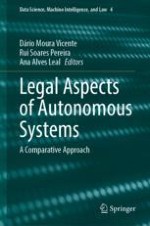2024 | OriginalPaper | Buchkapitel
Suppliers’ Civil Liability for Damage Caused by Autonomous Vehicles: A Brazilian Perspective
verfasst von : Giovana Benetti
Erschienen in: Legal Aspects of Autonomous Systems
Aktivieren Sie unsere intelligente Suche, um passende Fachinhalte oder Patente zu finden.
Wählen Sie Textabschnitte aus um mit Künstlicher Intelligenz passenden Patente zu finden. powered by
Markieren Sie Textabschnitte, um KI-gestützt weitere passende Inhalte zu finden. powered by
